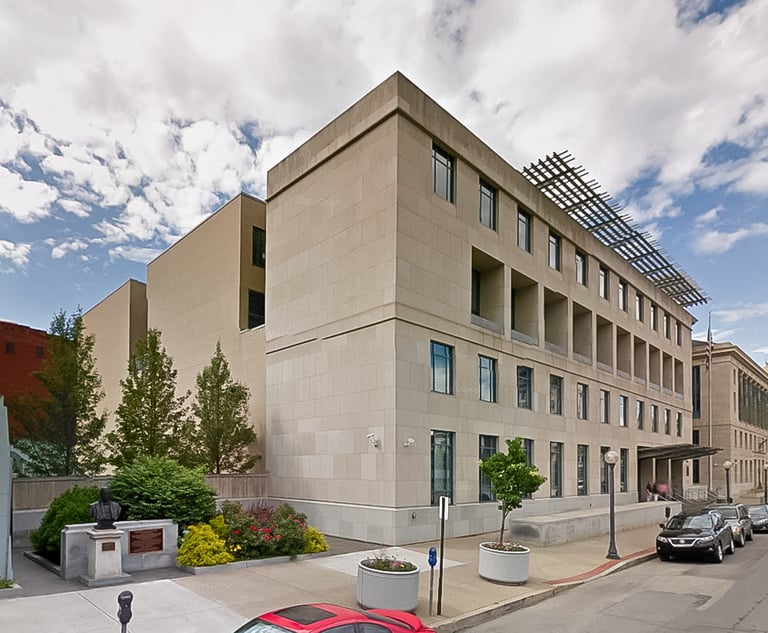Minor Changes in Statute Don't Merit Resentencing, 3rd Circuit Rules
In a ruling that could impact future appeals for prisoners seeking a reduced sentence for drug-related offenses, a federal appeals court has ruled that revision of a law without changing the language does not count as a "modification" under the First Step Act. The U.S. Court of Appeals for the Third Circuit reached its ruling in denying plaintiff Jamell Birt that his conviction of possession of crack with the intent to distribute qualified as a covered offense under the First Step Act, which would allow him to pursue reduced sentencing for cocaine-related conviction under the Fair Sentencing Act.
July 21, 2020 at 02:44 PM
3 minute read
 Photo: Inked Pixels/Shutterstock.com
Photo: Inked Pixels/Shutterstock.com
In a ruling that could impact future appeals for prisoners seeking a reduced sentence for drug-related offenses, a federal appeals court has ruled that revision of a law without changing the language does not count as a "modification" under the First Step Act.
The U.S. Court of Appeals for the Third Circuit reached its ruling in denying plaintiff Jamell Birt's that his conviction of possession of crack with the intent to distribute qualified as a covered offense under the First Step Act, which would allow him to pursue reduced sentencing for cocaine-related conviction under the Fair Sentencing Act.
However, Judge Kent Jordan said in the court's precedential July 20 opinion that the body text of the statute was untouched by a revision Congress made to subsections in the statute, and therefore Birt's argument failed because his penalty would have been the same.
"As he sees it, his conviction for possession with intent to distribute crack, in violation of 21 U.S.C. § 841(a)(1) and (b)(1)(C), qualifies as a 'covered offense' under the Act and so he is entitled to resentencing. We disagree," Jordan said. "'Covered offenses,' as the First Step Act defines that term, are offenses proscribed by criminal statutes that have had their penalty provisions modified by another statute, specifically the Fair Sentencing Act. But the penalties for Birt's statute of conviction have not been modified, and, without such a modification, the First Step Act has no applicability to Birt's case."
In 2001, Birt was arrested following a traffic stop in Pennsylvania, Jordan said. He allowed the responding state trooper to search his car, and 186.5 grams of crack cocaine were discovered in the trunk.
Birt was originally hit with state charges and released on bail, but was indicted federally after he violated the terms of his release. Birt pleased guilty and was given the maximum sentence of 20 years in prison.
On appeal Birt argued that his offense statute was modified by the Fair Sentencing Act, which was enacted to reduce sentencing disparities between crack and powder cocaine offenses.
Jordan noted, "As was said recently by a well-respected judge on the court where Birt was convicted, while the Fair Sentencing Act's increase in the amount of crack required to trigger a mandatory minimum penalty under § 841(a)(1)(B) 'did, in turn, increase the maximum amount of [crack] subject to penalty under … § 841(b)(1)(C), … that did not affect anyone originally sentenced under… § 841(b)(1)(C). Put simply, any defendant … sentenced under … § 841(b)(1)(C) prior to the enactment of the Fair Sentencing Act would presently be subject to the exact same statutory penalty of up to 20 years.'"
Birt's public defender is Fritz Ulrich, who did not respond to a request for comment. The U.S. Attorney's Office for the Middle District of Pennsylvania prosecuted the case and also did not respond to a request for comment.
This content has been archived. It is available through our partners, LexisNexis® and Bloomberg Law.
To view this content, please continue to their sites.
Not a Lexis Subscriber?
Subscribe Now
Not a Bloomberg Law Subscriber?
Subscribe Now
NOT FOR REPRINT
© 2025 ALM Global, LLC, All Rights Reserved. Request academic re-use from www.copyright.com. All other uses, submit a request to [email protected]. For more information visit Asset & Logo Licensing.
You Might Like
View All

3rd Circuit Strikes Down NLRB’s Monetary Remedies for Fired Starbucks Workers

Middle District of Pennsylvania's U.S. Attorney Announces Resignation
2 minute read
Judicial Appointments After Casey: Observers Wary but Hopeful Bipartisan Spirit Will Continue
Trending Stories
- 1People in the News—Jan. 14, 2025—Barley Snyder, Holland & Knight
- 2Matthew Donelson Joins Rawle & Henderson in Wilmington
- 3Agiloft Acquires AI-Powered Contract Playbook Provider Screens, Aiming to Foster Industry Standards
- 4Read the Document: DOJ Releases Ex-Special Counsel's Report Explaining Trump Prosecutions
- 5Houston Trial Lawyer Mary-Olga Lovett Leaves King & Spalding to Open Boutique





